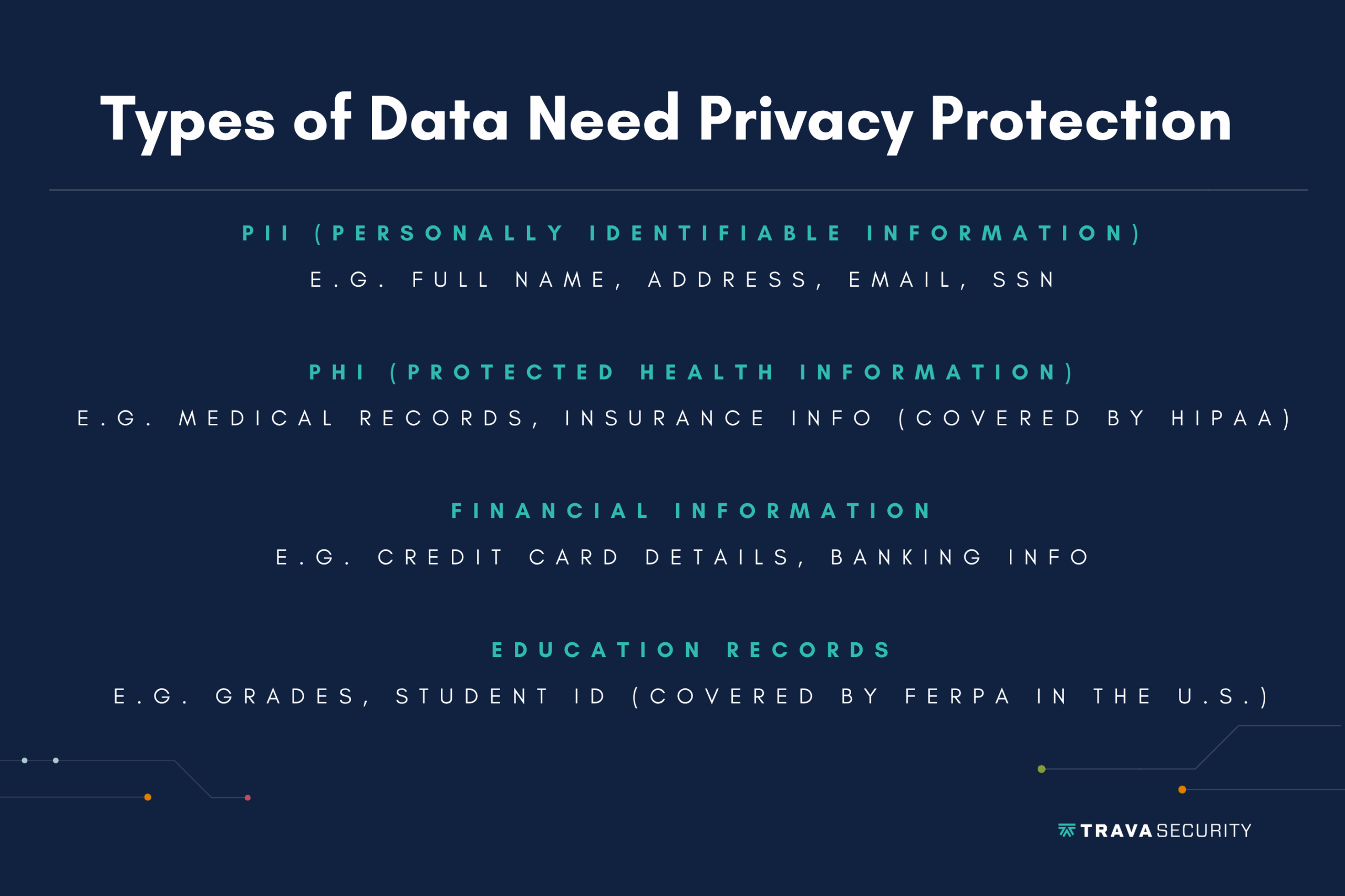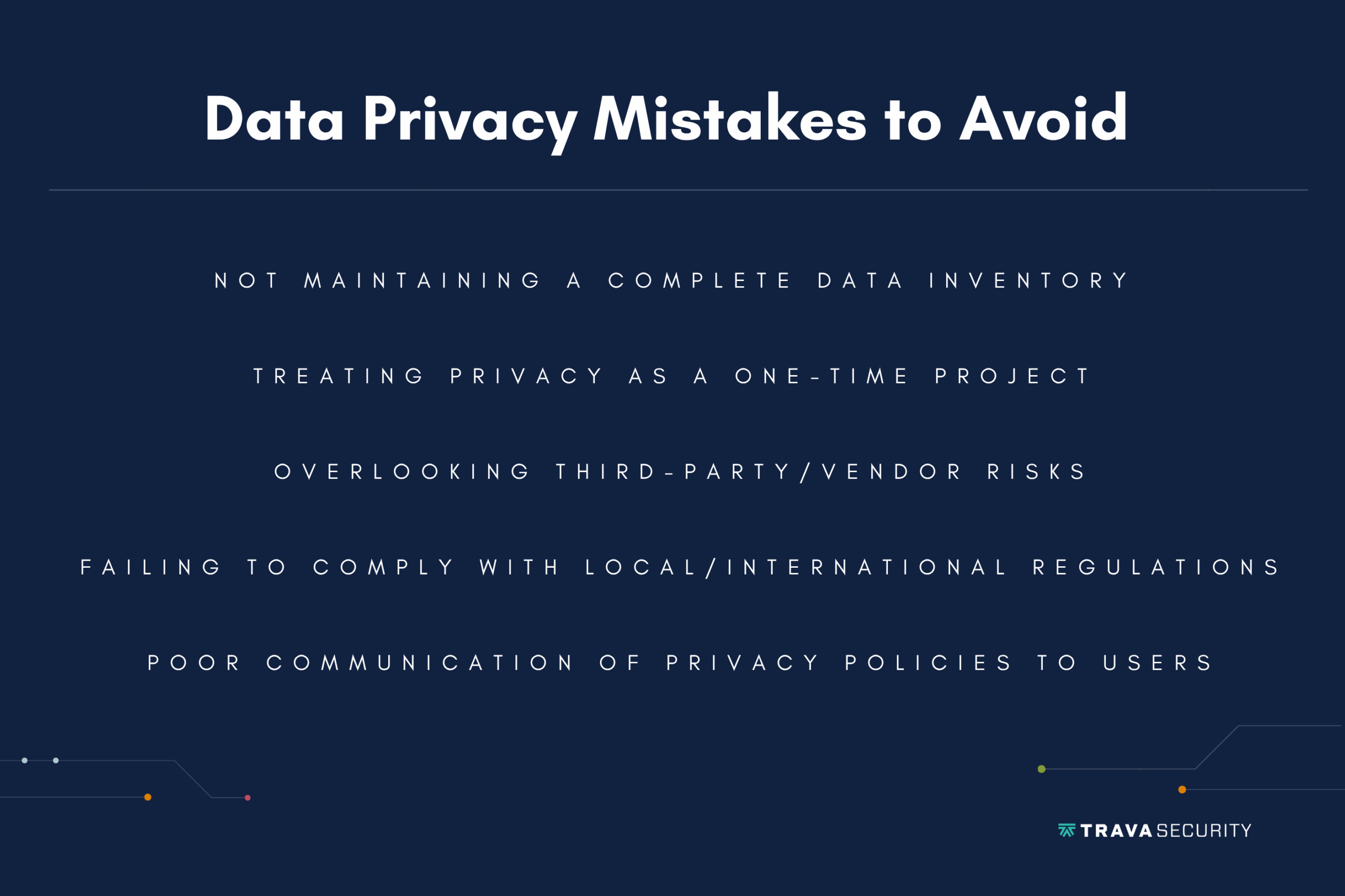Last updated: Septemeber 19, 2025
Table of Contents
- What is data privacy?
- Why is data privacy important?
- What is a data privacy policy?
- What are key data privacy laws businesses must know?
- How Many States Have Data Privacy Laws?
- What Is Data Privacy in Healthcare?
- What are common data privacy mistakes?
- 5 tips to protect data privacy
- Ready to Strengthen Your Data Privacy Strategy?
- FAQs About Data Privacy
Data privacy is more than just a compliance checkbox—it’s the foundation of trust between businesses and customers. As data breaches, evolving regulations, and consumer expectations increase, protecting personal information has become essential for companies of all sizes.
In this post, we’ll break down what data privacy is, why it’s important, what laws you need to know, and how your business can stay protected.
What is data privacy?
Data privacy (also called information privacy) is the practice of handling personal and sensitive information responsibly. This includes collecting, storing, sharing, and deleting data in ways that protect individuals’ rights.
It doesn’t necessarily mean that a company won’t collect your data. It means that if they do, they’re transparent about how it’s being used—and you have some control over that process.
At the heart of data privacy is Personally Identifiable Information (PII). PII refers to any data that can directly or indirectly identify an individual like:
- Names
- Email addresses
- Phone numbers
- or Social Security numbers
Data privacy laws and practices are designed to protect this kind of information from misuse, unauthorized access, or breaches. When companies collect and store PII, they must do so responsibly to safeguard individuals’ privacy and comply with regulations.
Personal data also includes:
- Medical history and health records
- Financial data like credit card or bank info
- Education records and other identifiers
Businesses must treat this data with care—not only to avoid legal trouble but to build trust with their customers.

Why is data privacy important?
If you’re wondering why data privacy is important, here’s the simple answer: people want to know that their personal information is safe.
Why is data privacy important for individuals?
- It prevents identity theft and fraud
- It offers control over how their data is used
- It protects sensitive health, financial, and behavioral information
Why is data privacy important for businesses?
- It builds trust with customers
- It avoids costly fines and reputational damage
- It supports data risk management and strengthens your overall security posture
Think of it this way…if your business doesn’t respect privacy, why should a customer trust you with anything else?
What is a data privacy policy?
A data privacy policy is a public document that explains how your company collects, uses, and protects personal information. It’s required under laws like GDPR and CCPA.
Your privacy policy should include:
- What types of data you collect
- How that data is used and stored
- Who you share data with (if anyone)
- How users can access, change, or delete their data
Bonus: a well-written policy also increases trust and transparency with your customers.
What are key data privacy laws businesses must know?
Understanding the legal landscape is crucial for any business handling personal data. Different regulations come with different requirements and consequences, so knowing which laws apply to your organization helps you stay compliant and avoid costly penalties. Here are some of the most important data privacy laws you should be aware of:
GDPR (General Data Protection Regulation)
- Applies to any business handling data from EU citizens
- Requires clear consent, data access rights, and data portability
- Fines can reach up to 4% of annual global revenue
Interested in learning more about GDPR? Read more about GDPR compliance requirements here.
CCPA (California Consumer Privacy Act)
- Grants California residents the right to know, delete, or opt out of data collection
- Applies to companies doing business in California or handling California data
- Inspires similar laws in other U.S. states
HIPAA (Health Insurance Portability and Accountability Act)
- Applies to health providers and any company handling health data
- Sets standards for PHI protection and secure data handling
How Many States Have Data Privacy Laws?
As of 2025, more than 15 U.S. states have passed comprehensive consumer data privacy laws, with more on the way. The most well-known is California’s CCPA, but states like Colorado, Virginia, Texas, and Utah have adopted similar legislation.
If your company serves users in different states, you need to be aware of varying laws. Your compliance strategy should cover all applicable jurisdictions, not just federal guidelines.
What Is Data Privacy in Healthcare?
Data privacy in healthcare refers to the protection of personal health information (PHI) such as medical histories, test results, and insurance data.
In the U.S., the Health Insurance Portability and Accountability Act (HIPAA) regulates how healthcare providers and their vendors handle this information.
Key protections include:
- Patients must consent before their data is shared
- Organizations must secure PHI from unauthorized access
- Violations can result in large fines and legal action
Whether you’re a healthcare organization or a SaaS vendor working with one, HIPAA compliance is non-negotiable.
What are common data privacy mistakes?
Even the best-intentioned companies can stumble when it comes to data privacy. Awareness of common pitfalls is the first step toward building a stronger privacy posture. Avoid these frequent mistakes to protect your business and your customers:
- No Data Inventory: Many companies don’t know what data they’re collecting or where it’s stored.
- Treating Privacy as a Project: Privacy management is ongoing, not a one-time task.
- Ignoring Third-Party Cybersecurity Risks: Vendors and partners can create serious vulnerabilities.
- Assuming You’re Exempt: Even small data exposures can trigger regulatory obligations.

5 tips to protect data privacy
If you’re wondering how to protect data privacy, here are five best practices businesses should follow:
- Collect only what you need: Minimize data collection to reduce risk and simplify compliance.
- Encrypt and restrict access: Use encryption, multi-factor authentication, and role-based access controls to keep data safe.
- Keep policies clear and transparent: Make your privacy policy easy to understand—and easy to find.
- Vet your vendors: Evaluate third-party data risks and ensure your partners follow strict protection standards.
- Conduct regular privacy audits: Regulations change. Technology changes. Your approach to privacy should too.
Ready to Strengthen Your Data Privacy Strategy?
You don’t have to navigate data privacy alone.
At Trava Security, we provide data privacy consulting for SaaS and B2B companies to help you:
- Understand which data privacy laws apply to your business
- Identify and secure sensitive data
- Build policies and practices that foster trust and compliance
FAQs About Data Privacy
What is data privacy in simple terms?
Data privacy means keeping personal information safe and being transparent about how it’s collected and used.
Why is data privacy important?
It protects people from identity theft and builds trust in the companies they interact with. For businesses, it also reduces legal and financial risks.
How many states have data privacy laws?
As of 2025, over 15 U.S. states have passed data privacy legislation, and more are drafting similar laws.
What is data privacy in healthcare?
Healthcare privacy laws like HIPAA ensure that patients’ medical records are kept secure and shared only with consent.
How can I protect my data privacy?
Limit what you share, use strong passwords, enable two-factor authentication, and review privacy settings on apps and services you use.


